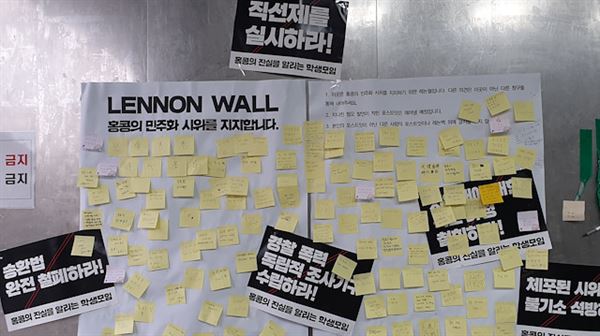Kim Ji-mun, a 23-year-old South Korean university student, had just put up a banner on campus with his friends in support of Hong Kong's pro-democracy
Kim Ji-mun, a 23-year-old South Korean university student, had just put up a banner on campus with his friends in support of Hong Kong’s pro-democracy protests when a group of Chinese students tried to take it down.
The encounter at Hanyang University in Seoul led to a seven-hour confrontation, he said, with the Koreans trying to protect their hand-written poster bearing the message “We join the democracy movement in Hong Kong”, and the other side jeering, throwing things and chanting “One China”.
“They come in groups, cursing and saying they would kill us. They took photos of the students who support Hong Kong and shared them on social media,” Kim told Reuters.
Kim said the Chinese students mocked the South Koreans in the Wednesday altercation, suggesting they had been paid to back Hong Kong, and making that point by throwing coins at them.
Hong Kong has been rocked by five months of protests by big crowds, with young people at the forefront, angered by what they see as Beijing’s stifling of freedoms despite a “one country, two systems” promise of autonomy when the city returned to Chinese rule in 1997.
China rejects the suggestion it is interfering in Hong Kong, and blames Western countries for inciting the trouble.
South Korea has its own painful history of student-led, pro-democracy protests, in particular a l980 uprising crushed by troops.
“South Korea received support from foreign countries when we fought for democracy. I couldn’t remain silent as I also share the belief in the value of democracy,” said another student, Kang Min-seo, 24.
Reuters could not track down contact information for the Chinese students involved in the Wednesday confrontation, or in several similar incidents that have taken place at South Korean universities.
Hong Kong’s protests have stirred similar confrontations in various places around the world in recent weeks, usually involving patriotic Chinese students.
‘BROTHERS’
China’s embassy in South Korea said it regretted “emotional conflicts” between the students but it was “natural and sensible” for Chinese students to display anger towards efforts to hurt their country’s sovereignty and distort facts.
A coalition of students supporting the Hong Kong protests criticised the embassy, saying it facilitated the Chinese students’ attempts to undermine democracy, and called for a protest next week to raise awareness of the issue.
“I have a room-mate from mainland China and we don’t talk about politics because we’d argue,” said Huang Shun Yi, a Taiwanese student at Hanyang University.
“But for me, Hong Kong and Taiwan are like brothers, and I want to help.”
At Seoul National University, students have created their own “Lennon Walls” – mosaics of Post-it notes named after the John Lennon Wall in communist-controlled Prague in the 1980s – which have appeared in Hong Kong.
Most notes called for support for Hong Kong’s freedom but some were not so enthusiastic. “Hong Kong is part of China,” one read.
Kim Dong-yoon, 23, a student at Korea University said Hong Kong’s protesters needed international support.
“We young people might seem uninterested in politics but we have pride in the principles of democracy,” Kim said.
